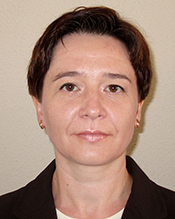Maria A. Monserud

Associate Professor
Phone: 713.743.3962
Email: mamonser@central.uh.edu
Download CV
Education
Ph.D., Sociology, Washington State University
M.A., Sociology, University of Northern Iowa
B.A., Philology, Saint Petersburg State University
Biography
Maria A. Monserud received her Ph.D. in sociology from Washington State University in 2008. Before coming to the University of Houston, Professor Monserud was a postdoctoral scholar in the Sealy Center on Aging at The University of Texas Medical Branch. She also completed a postdoctoral position in the Carolina Population Center at the University of North Carolina - Chapel Hill.
Professor Monserud’s research interests lie in the areas of family inequality, health disparities, minority aging and gender. In particular, she examines how various social factors intersect to shape individuals’ outcomes over their life course. To date, Professor Monserud’s research activities have encompassed three main areas: 1) continuities and discontinuities in intergenerational relationships in the family over time, 2) diversity in family structures and youth’s well-being and 3) family context, social support, gender and health outcomes among older Mexicans in the U.S. and Mexico.
Research Interests
- Health Disparities
- Health and Aging
- Family Inequality
- Racial/Ethnic Families
- Social Demography
- Quantitative Methodology
Teaching
- Introduction to the Sociology of Health Care
- Comparative Family Structures
- Population Analysis
- Introduction to Social Statistics
Selected Publications
- Monserud, Maria A. 2023. “Leisure Activities and Depressive Symptoms among Older Men and Women in Mexico: Implications of Physical Health.” Journal of Aging and Health 35(1-2):94–107. https://doi.org/10.1177/08982643221108036
- Monserud, Maria A. 2021. “Later-Life Trajectories of Cognitive Functioning among Immigrants of Mexican Origin: Implications of Age at Immigration and Social Resources.” Ethnicity & Health 26(5):720–736. https://doi.org/10.1080/13557858.2018.1547370
- Monserud, Maria A. 2019. “Later-Life Trajectories of Cognitive Functioning among Married and Widowed Older Men and Women of Mexican Origin.” Journal of Cross-Cultural Gerontology 34(3):307–324. https://doi.org/10.1007/s10823-019-09380-w
- Monserud, Maria A. 2019. “Trajectories of Limitations with Activities of Daily Living among Older Adults of Mexican Descent: The Role of Widowhood.” Marriage & Family Review 55(2):99-125. https://doi.org/10.1080/01494929.2018.1458007
- Monserud, Maria A. 2019. “Age Trajectories of Physical Health among Older Adults of Mexican Descent: Implications of Immigrant Status, Age at Immigration, and Gender.” Journal of Aging and Health 31(1):3-36. https://doi.org/10.1177/0898264317721823
- Monserud, Maria A. 2019. “Marital Status and Trajectories of Depressive Symptoms among Older Adults of Mexican Descent.” The International Journal of Aging and Human Development 88(1):22-45. https://doi.org/10.1177/0091415017752940
- Monserud, Maria A. and Kyriakos S. Markides. 2018. “Age Trajectories of Depressive Symptoms by Age at Immigration among Older Men and Women of Mexican Descent: The Role of Social Resources.” Sociological Perspectives 61(4):513-534. https://doi.org/10.1177/0731121417751378
- Monserud, Maria A. and Kyriakos S. Markides. 2017. “Changes in Depressive Symptoms during Widowhood among Older Mexican Americans: The Role of Financial Strain, Social Support, and Church Attendance.” Aging and Mental Health 21(6):586-594. https://doi.org/10.1080/13607863.2015.1132676
- Monserud, Maria A. and Rebeca Wong. 2015. “Depressive Symptoms among Older Mexicans: The Role of Widowhood, Gender, and Social Integration.” Research on Aging 37(8):856-886. https://doi.org/10.1177/0164027514568104
- Monserud, Maria and M. Kristen Peek. 2014. “Functional Limitations and Depressive Symptoms: A Longitudinal Analysis of Older Mexican American Couples.” Journals of Gerontology, Series B: Psychological Sciences and Social Sciences 69(5):743–762. https://doi.org/10.1093/geronb/gbu039
- Johnson, Monica K. and Monserud, Maria. 2012. “Work Value Development from Adolescence to Adulthood.” Advances in Life Course Research 17(2):45-58. https://doi.org/10.1016/j.alcr.2012.02.002
- Monserud, Maria A. and Elder, Glen H., Jr. 2011. “Household Structure and Children’s Educational Attainment: A Perspective on Coresidence with Grandparents.” Journal of Marriage and Family 73(5):981-1000. https://doi.org/10.1111/j.1741-3737.2011.00858.x.
- Monserud, Maria A. 2011. “Changes in Grandchildren’s Adult Role Statuses and their Relationships with Grandparents.” Journal of Family Issues 32(4):425-451. https://doi.org/10.1177/0192513X10384466
- Monserud, Maria A. 2010. “Continuity and Change in Grandchildren’s Closeness to Grandparents: Consequences of Changing Intergenerational Ties.” Marriage and Family Review 46(5):366-388. https://doi.org/10.1080/01494929.2010.528320
- Monserud, Maria A. 2010. “Role Markers of Adulthood and Young Adults’ Ties to Grandparents.” Journal of Intergenerational Relationships 8(1):38-53. https://doi.org/10.1080/15350770903520650
- Johnson, Monica K. and Monserud, Maria A. 2010. “Judgments about Work and the Features of Young Adults’ Jobs.” Work and Occupations 37(2):194-224. https://doi.org/10.1177/0730888410365973
- Johnson, Monica K. and Monserud, Maria A. 2009. “Values and Related beliefs”. Pp. 384-391 in Handbook of Youth and Young Adulthood: New Perspectives and Agenda, edited Andy Furlong. New York: Routledge. https://doi.org/10.4324/9780203881965
- Monserud, Maria A. 2008. “Intergenerational Relationships and Affectual Solidarity between Grandparents and Young Adults.” Journal of Marriage and Family 70(1):182-195. https://doi.org/10.1111/j.1741-3737.2007.00470.x
- Mack, Kristin Y., Leiber, Michael J., Featherstone, Richard A., and Monserud Maria A. 2007. “Reassessing the Family-Delinquency Association: Do Family Type, Family Processes, and Economic Factors Make a Difference?” Journal of Criminal Justice 35(1):51-67. https://doi.org/10.1016/j.jcrimjus.2006.11.015